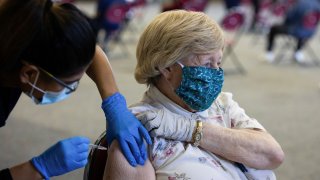
- Two doses of Covid vaccine prevented at least 330,000 deaths and nearly 700,000 hospitalizations among adult Medicare recipients in 2021, the Department of Health and Human Services said.
- The overwhelming majority of Medicare recipients, 86%, are 65 and older. The elderly face the highest risk of severe disease and death from Covid.
- The U.S. has rolled out new booster shots that target the dominant omicron BA.5 subvariant, and health officials believe the new booster will provide stronger protection this fall and winter.
Covid vaccines prevented at least 330,000 deaths and nearly 700,000 hospitalizations among adult Medicare recipients in 2021, the Health and Human Services Department said in a new report published Friday.
The reduction in hospitalizations due to vaccination saved more than $16 billion in medical costs, according to the HHS report. A 10% increase in vaccination coverage was associated with a 12% and 15% decline in the chances of hospitalization and death, respectively, among adult Medicare recipients, according to the study.
The HHS study looked at county-level data on vaccination rates and changes in hospitalization and death among a sample of Medicare beneficiaries ages 18 and older. Texas and Hawaii were not included in the study due to incomplete vaccination data.
Get top local stories in Southern California delivered to you every morning. Sign up for NBC LA's News Headlines newsletter.
The overwhelming majority of Medicare recipients, 86%, are ages 65 and older. Select groups under 65, such as people with disabilities, are also eligible for coverage. People who are not seniors make up about 14% of Medicare beneficiaries, according to data from the Centers for Medicare and Medicaid Services.
The elderly face the highest risk of severe disease and death from Covid. Nearly 93% of people ages 65 and older in the U.S. have received two doses of a Covid vaccine, according to the Centers for Disease Control and Prevention.
Despite the vaccine coverage within the highest risk group, more than 300 people are still dying each day on average from Covid, while more than 3,300 are hospitalized daily, according to CDC data. Dr. Ashish Jha, who heads the White House Covid task force, said 70% of Covid deaths are among people ages 75 and older.
Money Report
"This is unacceptable, particularly because we can now prevent almost every Covid death in the country with vaccines and treatments that we have," Jha told reporters during a call Friday.
Although most people ages 75 and older received their primary vaccine series, those who are dying are either not up to date on their boosters or are not receiving treatments such as Paxlovid when they have a breakthrough infection, Jha said. He added that death rates are dramatically higher among people in this age group who did not receive their first booster last fall.
"If you are up to date on your vaccines and you get treated when you have a breakthrough infection, your chances of dying are close to zero even in that high-risk population," Jha said.
Jha said the most important step people in this age group can take to protect themselves is to get the new booster shots that target the dominant omicron BA.5 subvariant along with the original strain of Covid.
The original Covid vaccines were developed against the first strain that emerged in China in 2019, and their effectiveness at preventing infection and mild illness has dropped substantially as the virus has mutated. Though they still generally protect against the worst outcomes, their ability to prevent hospitalization has also declined over time, particularly among elderly people who have not stayed up to date with their shots.
Health officials believe the new boosters will provide substantially better protection against disease because the shots now match the main Covid variant circulating in the U.S.
But the FDA and CDC authorized the new BA.5 boosters without data from human trials, so it's unclear how much more effective they will be than the old shots. FDA officials have said they authorized the boosters using the same process they use to change flu vaccines every year, which also normally doesn't rely on direct human data.
The HHS study did not look at the effect of booster shots on severe disease and death because those shots just started rolling out at the end of 2021.
The FDA authorized Pfizer's and Moderna's vaccines in December 2020. Seniors were the first in line to get the shots, and eligibility gradually expanded over the course of 2021.






